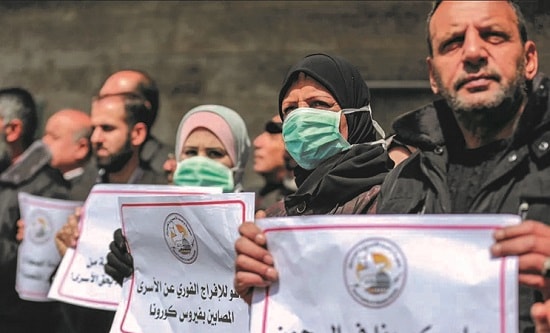
Coronavirus has spread to the occupied Palestinian territories, with both the West Bank and Gaza discovering their first confirmed cases in March. The decades of occupation and blockade the Israeli state has inflicted on these two territories leaves them extremely vulnerable and unprepared to deal with a possible coronavirus outbreak. Yet recent actions have shown that the Israeli state has no intention of letting up its crushing policies against the Palestinian people, even in the midst of an unprecedented pandemic threatening the lives of millions. WESAM KHALED reports.
The first case of Covid-19 in the West Bank was confirmed on 5 March 2020, carried by a tourist visiting Bethlehem. This has since risen to over 60 cases at the time of writing. On 22 March 2020, the Palestinian Authority (PA) declared a 14-day lockdown in the occupied West Bank to contain the spread of the virus. A Palestinian woman in her 60s became the first person to die from Covid-19 in the Palestinian West Bank on 25 March.
After decades of oppression at the hands of the Israeli state, which has occupied the West Bank for over 50 years, healthcare infrastructure in the territory is woefully unprepared to confront such a crisis. As a result of the punitive policies of the occupying Israeli government (which controls the flow of tax revenues to the PA) combined with PA corruption, the West Bank is equipped with only 1.23 hospital beds and 2.3 doctors per 1,000 people; by comparison, Italy, which has been left reeling from the effects of coronavirus, has 3.4 hospital beds and 4.1 doctors per 1,000 people. There are also fewer than 120 ventilators in all public hospitals in the West Bank. For a population of almost three million Palestinians, the result of an outbreak could be catastrophic.
Even more catastrophic would be the effect of an outbreak in the Gaza Strip, where Israel’s illegal 13-year blockade has decimated healthcare. Gaza suffers from chronic power outages and shortages of essential medicines and supplies, and 97% of all water in Gaza is considered unfit for human consumption by the World Health Organization. In January, before the threat of coronavirus reared its head, human rights group B’Tselem reported that Gaza was already experiencing an unprecedented health crisis fuelled by the surge in patients requiring treatment for injuries inflicted by Israeli soldiers in the ongoing ‘Great March of Return’ demonstrations, in which Israeli soldiers are operating unlawful ‘open-fire’ policies. A coronavirus outbreak in these debilitating conditions could result in losses of life on an unprecedented scale. Nine cases of Covid-19 have been confirmed in Gaza at time of writing, all of whom Gaza’s health ministry says are quarantined and have not mixed with the general public.
The Israeli state has also been hit by coronavirus, with 2,495 confirmed cases and five deaths at time of writing. This comes in the midst of a political crisis in Israel; in March 2020 Israel held its third inconclusive legislative election in less than a year. Two previous elections in April and September 2019 failed to produce a functioning coalition government, leaving the country in a political deadlock. Incumbent Prime Minister Benjamin Netanyahu sits at the heart of this deadlock, embroiled in scandal and facing indictments for bribery and corruption while refusing to step aside for a more viable candidate to form a coalition. Never one to pass up a chance to advance his own interests in the midst of widespread catastrophe, Netanyahu is attempting to turn the crisis to his advantage by pressuring his political opponents into forming an emergency government to weather the coronavirus storm. Talks between Netanyahu and opposition parties have already begun.
Whatever government does emerge from this deadlock, however, none of the leading Israeli political parties have any intention of ending the policies that have devastated the Palestinian territories; all are fully committed to continuing the occupation and ethnic cleansing of the West Bank and the siege on Gaza. Recent Israeli actions have shown that Israel will not cease its dehumanising policies against the Palestinians, even in the face of this unprecedented pandemic. On 23 February footage emerged showing Israeli soldiers deliberately crushing and killing a Palestinian man with a bulldozer before dragging and lifting up his body with the arm of the bulldozer to confirm that he was dead. On 23 March another video emerged of a Palestinian labourer, who had been working in Israel, being expelled from the country and dumped at a West Bank checkpoint after testing positive for Covid-19. The labourer collapsed at the checkpoint as a result of his symptoms, where Israeli soldiers left him unconscious until a Palestinian ambulance arrived three hours later.
Israel has thus far refused to release the 5,000 Palestinians it currently holds in Israeli prisons (including 180 children), despite four Palestinian prisoners testing positive for Covid-19 and calls for release to prevent further infections inside its prisons. And Israel has refused to lift its blockade on Gaza despite increased calls for it to do so.
The coronavirus crisis has cast most of the world into disarray, and Palestine is no exception. The future of the racist Israeli state’s political and social cohesion, its project of ethnic cleansing, and Palestinian resistance are all uncertain. But what remains certain is that concern for Palestinian life will not factor into Israel’s response to the coronavirus crisis any more than it has factored into the decades of oppression Israel has inflicted on the Palestinian people.
Fight Racism! Fight Imperialism! No 275, March/April 2020




